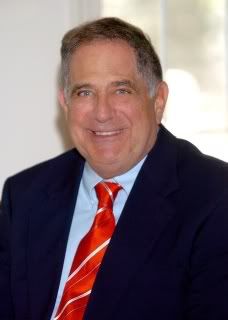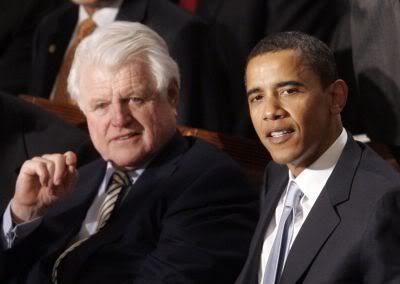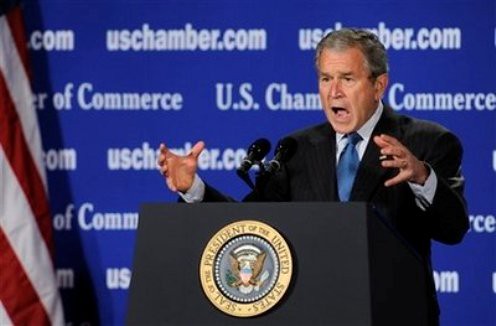Originally published by
Monthly Review and crossposted to The Crusty Polemicist
The nationalist not only does not disapprove of atrocities committed by his own side, but he has a remarkable capacity for not even hearing about them.
-George Orwell, Notes on Nationalism
In March 2003, Khalid Sheikh Mohammed, alleged mastermind of the 9/11 attacks, was captured in Pakistan. Much of the information on his movements and whereabouts is believed to have come from interrogations of his two children, aged six and eight. The children are known to have been held in an adult detention facility for at least four months while they were interrogated. During this time, according to one witness, “the boys were kept in a separate area upstairs, and were denied food and water by other guards. They were also mentally tortured by having ants or other creatures put on their legs to scare them and get them to say where their father was hiding.” After that, they disappeared into the system and nothing more was heard about them. Their current whereabouts and condition are unknown. The United States has sunk to kidnapping, imprisoning, torturing, and then “disappearing” children in order to get at their parents. What were once dark and unlikely rumors have gradually proven to be true: many men, women, and yes, children have been abducted around the world and fed into the maw of the American system.
The extrajudicial prison complex at Guantánamo is nothing much to look at, really: a small collection of steel cages and isolation cells that hold roughly five hundred human beings. In many ways, it is a showpiece, a little Potemkin village, the public face of the system. When people speak of “Guantánamo,” they often refer not to the physical site, but rather to the system as a whole and what that system represents: decisions made, Rubicons crossed, illusions embraced.
French philosopher Jean-Paul Sartre devoted enormous energy to analyzing the question of the individual’s remarkable ability to live “as if” certain demonstrably true things were actually nothing of the kind. He gives us the immortal example of the waiter who denies his human freedom-and thus, by implication, his human culpability-by shaping his behavior and demeanor so that he is seen, not as a free human being, but as “a waiter.” As such, he bears no responsibility for any of the consequences of any of his actions. He is, after all, merely “a waiter.” This phenomenon is given the label of mauvais foi-usually translated as “bad faith,” though some translators prefer the more descriptive term “self-deception.” One denies one’s total freedom by choosing to behave as if something was or was not true. We try to convince ourselves that we are compelled (by circumstances, our nature, an external threat) to behave as we do. We simply have no choice, you see. Moreover, thanks to our unswerving fidelity to our own individual bad faith, we are able to some extent to rewrite our histories as our situations evolve.*
*Jean-Paul Sartre, “Being and Nothingness (New York: Washington Square Press, 1993).
Sociologist Stanley Cohen’s work offers us a way to bootstrap Sartre’s insight from the realm of the personal into the realms of the social and political through his use of the deceptively simple concept of “denial,” the idea that, like individuals, entire societies “arrive at unwritten agreements about what can be publicly remembered and acknowledged.” An entire society can “pretend to believe information that they know is false or fake their allegiance to meaningless slogans and kitsch ceremonies.” Cohen’s concept of denial enables us to take hold of Sartre’s bad faith and use it as a powerful tool for analyzing how an entire society can suffer from self-induced amnesia about important aspects of its own history.†
† Stanley Cohen, States of Denial (Cambridge: Polity, 1971).
The United States made a moral choice after 9/11, and some day it will have to answer for the choice it made-not to the world, but rather to its own collective conscience and its own collective sense of what “America” means. Cohen explains how nations, like individuals, will manufacture alibis to deal with the reality of their actions, and it is inevitable that someday the United States will try, through various means, to convince itself that it never committed the outrages it has plainly committed since 9/11. Other nations have also struggled to forget their crimes and rewrite their own histories. Turkey with its Armenian genocide, France with its widespread collaboration with the Nazis, Japan with its many horrific acts during the Second World War, Israel with its displacement and slow-motion genocide of the Palestinians-all have manufactured and deployed their own national alibis. Germany, in stepping up to its criminal responsibility, is the rare exception, and one suspects that a large part of the reason for Germany’s openness is that the evidence of its crimes was too widespread and obvious to deny or rewrite.
Modern cognitive theories are deeply Socratic, and as such are deeply flawed. They take as their central premise the idea that if you distort the external world it is because your faculties of information processing and decision making are faulty. In other words, distortion of reality is the result of some more or less mechanical defect or mistake, never the result of a conscious, fundamental decision. As it happens, we know from history that countries choose to deny their own histories all the time, and it is obvious that the United States is in the early stages of manufacturing its own set of national alibis. What does it take for an entire country to lie to itself? And what shape will this bad faith take in the United States? As citizens of a democracy, the U.S. people will submit to the self-deception because of a willing identification with the country’s manufactured history, not because of any fear of “arbitrary imprisonment, commissars or secret police.” The complicit U.S. citizen is no Winston Smith, driven to that level of madness where 1+1=5. We must never forget that, for the last several years, the American people have willingly identified with the Guantánamo project, and with all the implications and consequences of that project. As willing participants, the citizens of the United States can be expected to defend their decision with exceptional ferocity.
Nations, like individuals, “negotiate their realities,” and Washington has already begun the process of utilizing all the usual techniques of bad faith as it wallows deeper and deeper in its manufactured “post-9/11 world.” These techniques for enabling self-deception on a national scale are well known, and would seem almost childishly simple were it not for the fact that they have proven so effective so often.
The first technique of denial is also the most obvious: simple, unadulterated denial. The horrible things that those bad people are alleging are simply not true. They never happened, nor would America ever allow them to happen. The United States does not operate secret CIA-run “black sites” in Eastern Europe. None of the reports of significant civilian casualties from U.S. air strikes in Afghanistan are true. Everything is normal, nothing to see here. A variation on this theme is what one might call “denial of injury.” Yes, perhaps some of those so-called “bad” things are happening, but no one is being hurt. The United States of America “does not torture” and the detainees scattered among the system’s secret places are merely being subjected to “vigorous interrogation.” Indeed, the Guantánamo detainees live under conditions much more pleasant than those of the average inmate in a stateside prison. This denial of injury thus demands a radical renaming, a systematic refusal to call things by their real names. After all, real names bring with them real consequences, and can bring with them a real obligation to act.
A technique that has found particularly fertile ground in the United States is to deny the reality of the victim as victim. After all, “they started it on 9/11,” and their actions prove that they are incorrigible evildoers, undeserving of any civilized treatment. This technique requires the total dehumanization of the “evildoers,” the better to enable the jailers and torturers to commit their outrages. Even the most degraded and brutish torturers need this salve for their consciences, because they realize that if this squealing piece of meat they are defiling is actually human, then they themselves must be monsters for doing what they do. But since these evil monsters-who, one must constantly remind oneself, “started it on 9/11”-are obviously something less than human, anything is permitted. The inevitable result of this refusal to acknowledge the reality of the victim as victim was Abu Ghraib, where the naked detainees were not victims, but simply masses of unfeeling meat that could be shaped and posed to satisfy the porn-addled imaginations of their tormenters.
Right-wing elements in the U.S. media and political system have perfected the technique of “accusing the accuser.” The person, organization, or nation that questions any action is either gullible or biased. The accusers are either brainless dupes, or else they are active, malevolent terrorist sympathizers. They cannot be anything else, because to entertain such a possibility would force a confrontation with the idea that the accusers’ claims might actually have some legitimate merit. When John Ashcroft appeared before the Senate Judiciary Committee in December 2001, he brushed aside any concerns about the erosion of constitutional safeguards, proclaiming that critics who raised such concerns were “aiding the terrorists” and “giving ammunition to America’s enemies.” These critics were, in other words, traitors.
The technique of “denial of responsibility,” so popular in more hierarchical societies, has not really achieved a lot of traction in the ruggedly individualistic mythos of America. While the government has made some pro forma declarations in this area-certain actions were the result of a few “bad apples” or were required by harsh necessity-the simple fact is that the American psyche wants to be proud of doing these things. Rather than denying responsibility, Americans instinctively seek to apply the technique of “justification,” proclaiming that, whatever is being done, there is nothing to fear because it is being done within the law, protected by the Constitution, and most importantly of all, “morally justified.”
When all else fails, a nation can always fall back on one of the most reliable methods of denial: the “appeal to higher loyalties.” Cohen formulates the principle behind this technique succinctly: “your nation is exalted, extraordinary, and possessed of a higher wisdom and morality that permits-even demands-any means towards the higher good.” The fact that the United States perceives itself as the exceptional nation lends itself to an enthusiastic acceptance of this technique of denial. One need only remember its long-running love affair with “Manifest Destiny” to realize how much it will deny about its own behavior when pursuing its unique world-historical mission. But when the alarm is sounded-“The Homeland in Danger!”-the United States embraces the idea of a higher loyalty with a fervor that is blatantly religious. One tries to pretend that people like Harriet Miers and Alberto Gonzales-who placed loyalty to their mission and their leader above their duty to the Constitution-are exceptions, aberrations, “bad apples.” In fact, millions of otherwise ordinary Americans have proven more than willing to put aside everything that makes them Americans in the name of these new, post-9/11 “higher loyalties.”
After all this hard work-and make no mistake, self-deception on a national scale is very hard work indeed-what is it in aid of? What is to be accomplished? Nothing less than the normalization of criminality. Horrors and atrocities are to be ignored, or made to seem normal-even beneficial. Normalization is achieved when the citizens demonstrate their embrace of the national alibis in a number of ways.
Accommodation, committing the many small daily compromises and betrayals that allow one to accept the situation as “the new normal.”
Routinization, rendering the horrors mundane and banal, thus draining them of their emotional content.
Tolerance, understood in the same sense of the word that is used to describe an addict’s capacity for more and more of the drug without experiencing any noticeable effect.
Collusion, the active participation by more and more of the population in the criminal activities.
Cover-up, the active participation by more and more of the population in hiding the evidence and consequences of the criminal activities.
The rhetoric of normalization is institutionalized and made public, both formally (through press briefings) and informally, through the constant background hum of precisely shaped news as well as the more strident rants emanating from hate radio. With these tools for propagandizing and educating, it is almost too easy to convince an entire society to be complicit in crimes and atrocities.
The neighbor who looks the other way when an immigrant is harassed is culpable in the normalization of criminality. The lawyer who buries evidence because it would cause too much extra work and generate too much controversy is culpable in the normalization of criminality. The journalist who avoids writing certain stories, and the editor who avoids running such stories, are culpable in the normalization of criminality. And to the extent that they know but persuade themselves that they do not know, the people of the United States as a whole are culpable in the normalization of criminality.
Denial, dehumanization, normalization: given these three, I could turn your maiden Aunt Estelle into an enthusiastic torturer and she would have no problem sleeping like a baby at night.
Sartre tells us that we can never escape total responsibility for our actions. Any alibi we manufacture is itself a choice that we make and thus endorse, and for which we must accept full responsibility. If we allow the present American reality to be denied, then we will surely allow it to be forgotten. The United States will-it must-try to forget Guantánamo, because to face up to everything that Guantánamo means would reveal to all Americans what they have become. Guantánamo is rapidly becoming not the repudiation but the product of the American soul, in the same way that the Holocaust was the product of the German soul and the tormenting of the Palestinians is the product of the souls of those who survived the Holocaust. To pretend otherwise is to make oneself complicit in their bad faith.
Those of us who still possess a rational conscience-and our numbers are dwindling, make no mistake-must bear witness so that the United States will never be able to look back on its past (our present) and pretend it was something other than what it was. We U.S. public intellectuals-if such a phrase can even be used unironically any more-must step up to our one remaining unambiguous duty: to testify plainly. We cannot allow the United States of America to deny Guantánamo, because to deny Guantánamo is to forget Guantánamo and then eventually to write Guantánamo out of U.S. history. As Cohen warns us, “the passivity of those who watch, know and close their eyes becomes a form of complicity.”



 According to
According to 

